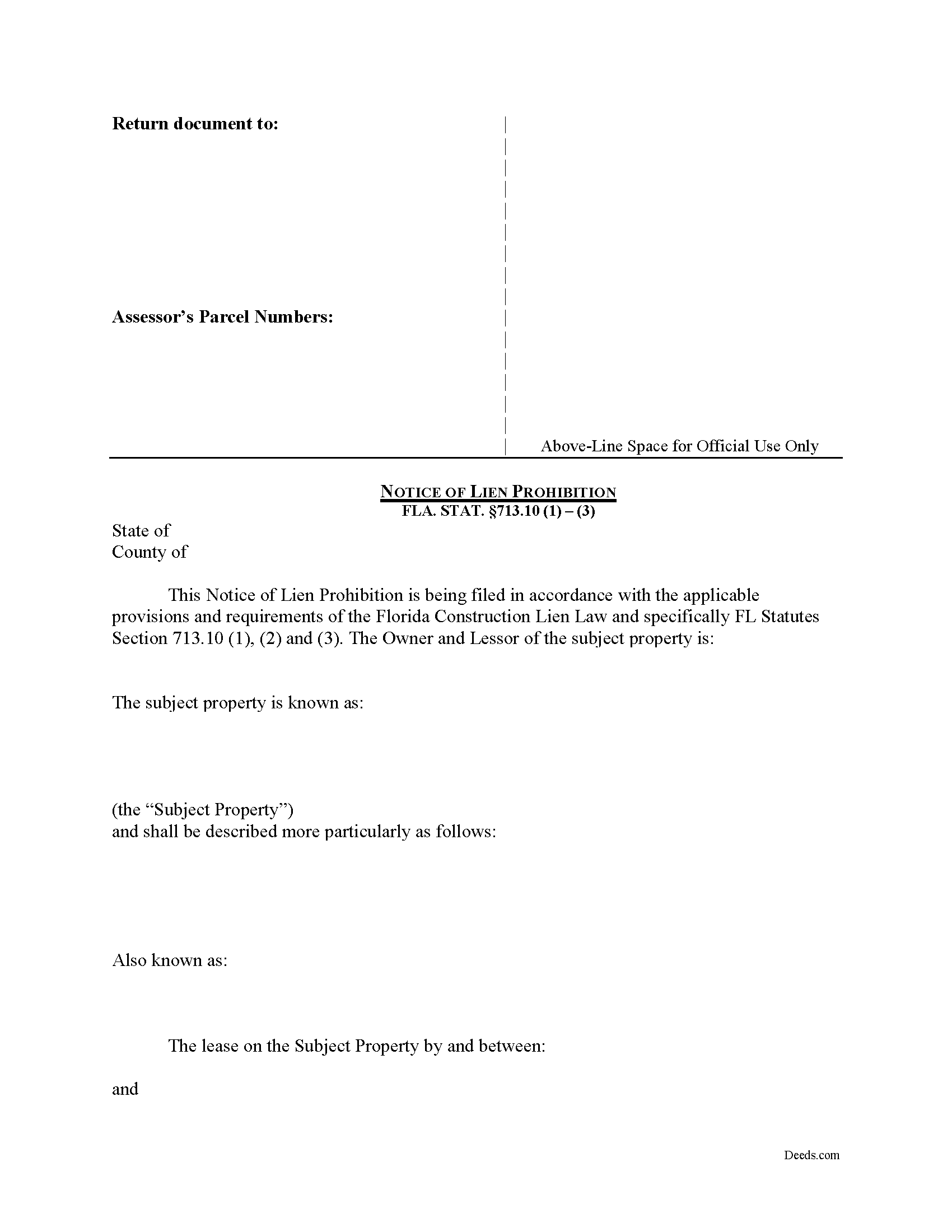Download Florida Notice of Lien Prohibition Legal Forms

Florida Notice of Lien Prohibition Overview

Prohibiting Mechanic's Liens on Leased Property
As a landlord, it's important to ensure tenants don't incur any encumbrance on your property. Tenants might engage a contractor in labor or delivery of materials that can result in a lien placed on your real estate. A notice of lien prohibition puts any potential claimant on notice that the tenant is prohibited from subjecting the property to a lien.
Under state law, a lien shall extend to, and only to, the right, title, and interest of the person who contracts for the improvement as such right, title, and interest exists at the commencement of the improvement or is thereafter acquired in the real property. FLA. STAT. 713.10(1). When an improvement is made by a lessee in accordance with an agreement between such lessee and her or his lessor, the lien shall extend also to the interest of such lessor. Id.
When the lease expressly provides that the interest of the lessor shall not be subject to liens for improvements made by the lessee, the lessee shall notify the contractor making any such improvements of such provision or provisions in the lease, and the knowing or willful failure of the lessee to provide such notice to the contractor shall render the contract between the lessee and the contractor voidable at the option of the contractor. FLA. STAT. 713.10(2)(a).
The interest of the lessor is not subject to liens for improvements made by the lessee when: (1) the lease, or a short form or a memorandum of the lease that contains the specific language in the lease prohibiting such liability, is recorded in the official records of the county where the premises are located before the recording of a notice of commencement for improvements to the premises and the terms of the lease expressly prohibit such liability; or (2) the terms of the lease expressly prohibit such liability, and a notice advising that leases for the rental of premises on a parcel of land prohibit such liability has been recorded in the official records of the county in which the parcel of land is located before the recording of a notice of commencement for improvements to the premises. FLA. STAT. 713.10(2)(b).
The Notice must include the following information: (a) the name of the lessor; (b) the legal description of the parcel of land to which the notice applies; (c) the specific language contained in the various leases prohibiting such liability; and (d) a statement that all or a majority of the leases entered into for premises on the parcel of land expressly prohibit such liability. FLA. STAT. 713.10(2)(b)(2).
The interest of the lessor is also not subject to liens for improvements made by the lessee when the lessee is a mobile home owner who is leasing a mobile home lot in a mobile home park from the lessor. FLA. STAT. 713.10(2)(b)(3).
This Notice effectively prohibits liens for improvements made by a lessee even if other leases for premises on the parcel do not expressly prohibit liens or if provisions of each lease restricting the application of liens are not identical. Id.
Any contractor or lienor under contract to furnish labor, services, or materials for improvements being made by a lessee may serve written demand on the lessor for a copy of the provision in the lease prohibiting liability for improvements made by the lessee. FLA. STAT. 713.10(3). The demand must identify the lessee and the premises being improved and must be in a document that is separate from the notice to the owner. Id.
The interest of any lessor who does not serve a verified copy of the lease provision within 30 days after demand, or who serves a false or fraudulent copy, is subject to a lien under this part by the contractor or lienor who made the demand if the contractor or lienor has otherwise complied with this part and did not have actual notice that the interest of the lessor was not subject to a lien for improvements made by the lessee. Id.
This article is provided for informational purposes only and is not legal advice. Do not rely on this article as a substitute for consulting with a licensed attorney. If you have any questions about prohibiting liens on property or about mechanic's liens, please speak with an attorney.